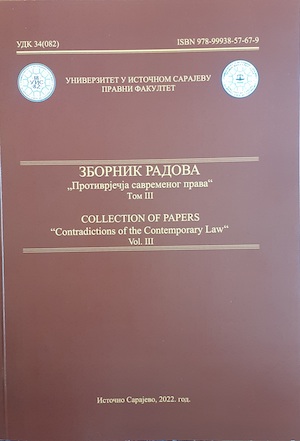Noxa, pauperies e magia nella legislazione decemvirale: condanne di falsa nossalità in ordine alla differente configurazione della responsibilità del pater per il danno provocato dal sottoposto rispetto a quello dell' animale
Noxa, Pauperies and Magic in the Decemviral Legislation: Sentences of False Nossality in Relation to the Different Configuration of Liability of the Pater for the Damage Caused by the Subject With Respect to That of the Animal
Author(s): Giovanni Brandi Cordasco Salmena
Subject(s): Law, Constitution, Jurisprudence, Roman law
Published by: Правни факултет Универзитета у Источном Сарајеву
Keywords: False nossality; Incantamenta; Harm of the animal; Decemviral legislation;
Summary/Abstract: Already the legislation of the XII Tables consecrated, in the course of a difficult evolution of the unlawful acts, means of protection in case of liability of the pater for the damage caused by his subjects or his animals as well as in defense of some "magical" illicit acts. The considerations underlying a different reconstruction of the nossal abbandon, compared to that proposed by the doctrine subsequent to Biondi, allow us to advance the hypothesis that, both the filius and the slave, in performing an unlawful act, may remain obligated to civiliter ex delicto. The result is a personal responsibility and a condemnation comforted by the ancient private revenge, the actio noxalis being structured as a vindicatio of the guilty. The pater or domanus will not be convicted on the bases of a direct responsibility to the injured person but on the basis of the power relationship with the subject. In summary, the head of the family when he wants to assume the consequences of the illegal act committed by those who fall under his power, will intervene in the judgment and if unsuccessful will pay a sum of money. On the contrary, he will intervene in the judgment only to complete the dedicated noxae. Given this mechanism, the actio dei pauperie and the means that recall its discipline, are based on the dominium that the owner of the animal boasts of the same and for which he responds almost always objectively. The equalization between the penalties (sometimes even very serious) provided by the damage caused by the animal and those provided for by the normal nossal procedure is only external, made by the compilers on the basis of a different meaning of nox (now only corpus quod nocuit) attributable indifferently both to the illicit act of the subject and to the damage of the animal.
Book: Зборник радова "Противрјечја савременог права" Том III
- Page Range: 49-155
- Page Count: 107
- Publication Year: 2022
- Language: Italian
- Content File-PDF

